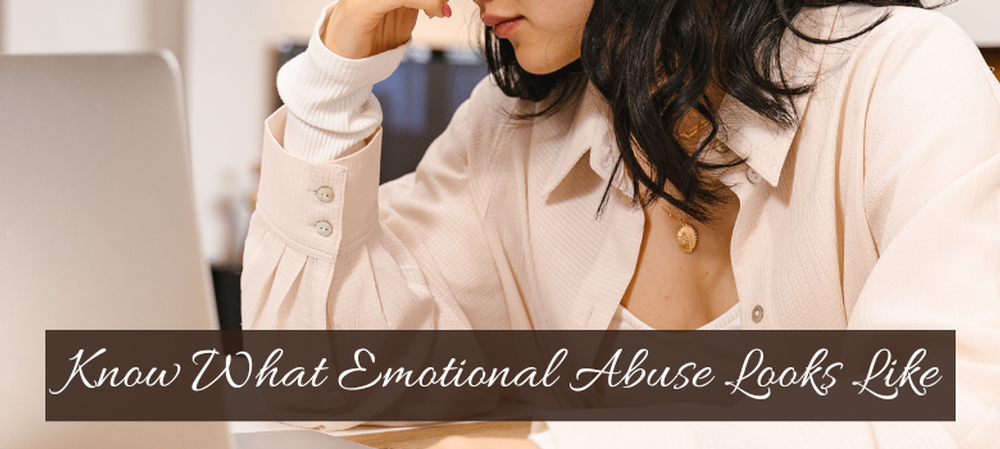Know What Emotional Abuse Looks Like

What Is Emotional Abuse?
Emotional abuse is a type of abuse that involves the emotional maltreatment of an individual such as a child, adolescent, adult, or elder. Emotional abuse is also termed psychological abuse or mental abuse. Emotional abuse is a form of abuse that affects the psyche (mental and emotional) without the physical abuse. You can visually see the signs of physical abuse, but, with emotional abuse, you cannot see the signs on the physical body.
Emotional Abuse as a Loving Gesture
Emotional abuse is, typically, done in a very cunning and devious manner. Emotional abuse may not be obvious to you especially if you had suffered from emotional abuse as a child or adolescent. Emotional abuse can be difficult to identify because of its subtle nature. It may even be looked at as a loving behavior, such as when your spouse or partner explains to you that they were only looking out for you by yelling at you when you were talking to a stranger at the restaurant or when you came home later than what they expected. However, emotional abuse if far from a loving behavior. The abuser’s behavior is an act of control and manipulation trying to intimidate, isolate, scare, or threaten their victim.
Emotional Abuse as Manipulation
Emotional abuse can also look like bullying, passive-aggressive behavior (e.g., backhanded compliments (similar to sarcasm), sulking, refusal to communicate), and negging (dismissive and degrading comments that undermines self-confidence).
Gaslighting Is an Aspect of Emotional Abuse
Gaslighting is also an aspect of emotional abuse. It is a tactic to gain power and make the person question their reality. It’s easy to get sucked into gaslighting because it is slow and progressive and, basically, you’re swallowed up by it before you even know it. Emotional abuse wears you down slowly. Eventually, you feel like you are walking on eggshells, and you begin to doubt your self, your abilities, and your self-concept. The abuse is a critical feature of intimate partner violence.
Some Signs of Emotional Abuse:
- The “unable to take a joke” when the joke is on you using sarcasm or mocking behavior.
- Making patronizing comments.
- Putting down your interests.
- Infantizing you or acting as though they know what’s best for you.
- Deliberately putting you in an uncomfortable position such as locking you out of your home.
- Telling you how you should feel. Dismissing your feelings.
- Telling you that you are overreacting (to all of the examples I mentioned above).
- Refusing to take responsibility for their actions even after you’ve made it clear about their behavior.
- Monitoring your whereabouts and/or how often you check in.
- Intimidating you to spend all of your time with them.
- Withholding affecting or communication as a form of punishment.
- Deliberately picking arguments.
- Hiding or destroying your belongings.
Effects of Emotional Abuse
1. Stress Disorders
Emotional abuse can lead to trauma which then shows up as post-traumatic stress disorder (PTSD) or complex post-traumatic stress disorder (C-PTSD). If you experience PTSD, it usually means that you experienced emotional abuse or gaslighting for a shorter period of time; it’s more acute. If you have been diagnosed with C-PTSD, the trauma you experienced was chronic or over a longer period of time.
2. Mood Disorders, Maladaptive Coping Skills, Low Self-Concept
Emotionally abusive relationships are definitely complex, but many of the victims are surprised about how subtle their partners behavior was, initially, and how the effects of the emotional abuse came about in themselves personally. Many individuals didn’t recognize the signs until they started experiencing depression and anxiety and a loss of self-esteem, self-confidence, and self-worth. Many stopped seeing their friends and family; they participated less and less in society. A way for victims to cope with this emotional abuse from their partner is usually maladaptive. They started using alcohol or maybe prescription drugs to calm themselves down or to try to dull the pain of feeling like they are the burden. They may binge eat or not eat at all. Smoking, shopping, and even gambling can become ways to cope which further deteriorates their self-concept and self-worth.
3. Physical Symptoms
Emotional abuse can make you feel fearful, shameful, anxious, confused, and hopeless; this can lead to a difficulty in concentrating, moodiness, ruminating thoughts, an elevated stress response (which can cause many more physical health issues such as heart disease), muscle tension, headaches, stomach (GI) issues, sleeping disorders, or chronic fatigue and chronic pain syndromes. Social withdrawal and loneliness are two long-term effects of emotional abuse which further complicates the victim’s life.
The Vicious Cycle of Abuse
Once a victim reaches out for support, they can get help, but the first step is to reach out! I’ve been there. I know what it is like – gaslighting, emotional abuse. You get stuck in this cycle and because your self-concept is so low, you think you’ll never be able to get out. Being in a relationship that is emotionally abusive keeps you in a vicious cycle. You’re drawn-in by believing their stories. You sympathize. You have hope. Then, it happens all over again. You feel like everything is your fault, and you are the cause of the problem.
Reach Out for Support
If you need immediate support, please call your local authorities, safe houses, or 911. If you are not in any threat or physical danger but want to reach out to someone that understands, connect on one of my Zoom calls on my Facebook page. Together, we can build a strong community and reach for something better and healthier.
Do You Have a Question About Coaching?
Reach out to desiree@desireeleigh.com